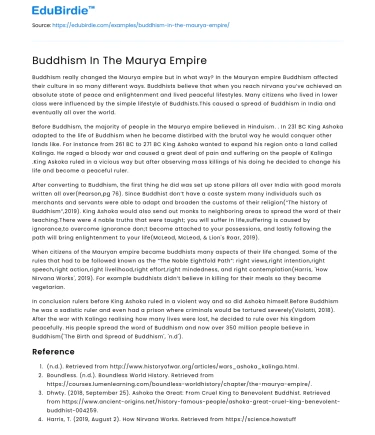Buddhism really changed the Maurya empire but in what way? In the Mauryan empire Buddhism affected their culture in so many different ways. Buddhists believe that when you reach nirvana you’ve achieved an absolute state of peace and enlightenment and lived peaceful lifestyles. Many citizens who lived in lower class were influenced by the simple lifestyle of Buddhists.This caused a spread of Buddhism in India and eventually all over the world.
Before Buddhism, the majority of people in the Maurya empire believed in Hinduism. . In 231 BC King Ashoka adapted to the life of Buddhism when he became distirbed with the brutal way he would conquer other lands like. For instance from 261 BC to 271 BC King Ashoka wanted to expand his region onto a land called Kalinga. He raged a bloody war and caused a great deal of pain and suffering on the people of Kalinga .King Askoka ruled in a vicious way but after observing mass killings of his doing he decided to change his life and become a peaceful ruler.
Save your time!
We can take care of your essay
- Proper editing and formatting
- Free revision, title page, and bibliography
- Flexible prices and money-back guarantee
After converting to Buddhism, the first thing he did was set up stone pillars all over India with good morals written all over(Pearson,pg 76). Since Buddhist don’t have a caste system many individuals such as merchants and servants were able to adapt and broaden the customs of their religion(“The history of Buddhism”,2019). King Ashoka would also send out monks to neighboring areas to spread the word of their teaching.There were 4 noble truths that were taught; you will suffer in life,suffering is caused by ignorance,to overcome ignorance don;t become attached to your possessions, and lastly following the path will bring enlightenment to your life(McLeod, McLeod, & Lion's Roar, 2019).
When citizens of the Mauryan empire became buddhists many aspects of their life changed. Some of the rules that had to be followed known as the “The Noble Eightfold Path”: right views,right intention,right speech,right action,right livelihood,right effort,right mindedness, and right contemplation(Harris, 'How Nirvana Works', 2019). For example buddhists didn’t believe in killing for their meals so they became vegetarian.
In conclusion rulers before King Ashoka ruled in a violent way and so did Ashoka himself.Before Buddhism he was a sadistic ruler and even had a prison where criminals would be tortured severely(Violatti, 2018). After the war with Kalinga realising how many lives were lost, he decided to rule over his kingdom peacefully. His people spread the word of Buddhism and now over 350 million people believe in Buddhism('The Birth and Spread of Buddhism', 'n.d').
Reference
- (n.d.). Retrieved from http://www.historyofwar.org/articles/wars_ashoka_kalinga.html.
- Boundless. (n.d.). Boundless World History. Retrieved from https://courses.lumenlearning.com/boundless-worldhistory/chapter/the-maurya-empire/.
- Dhwty. (2018, September 25). Ashoka the Great: From Cruel King to Benevolent Buddhist. Retrieved from https://www.ancient-origins.net/history-famous-people/ashoka-great-cruel-king-benevolent-buddhist-004259.
- Harris, T. (2019, August 2). How Nirvana Works. Retrieved from https://science.howstuffworks.com/science-vs-myth/extrasensory-perceptions/nirvana2.htm.
- History.com Editors. (2017, October 12). Buddhism. Retrieved from https://www.history.com/topics/religion/buddhism.
- McLeod, M., McLeod, M., & Lion's Roar. (2019, December 6). The Four Noble Truths. Retrieved from https://www.lionsroar.com/what-are-the-four-noble-truths/.
- The history of Buddhism. (n.d.). Retrieved from https://www.khanacademy.org/humanities/world-history/ancient-medieval/early-indian-empires/a/buddhism-in-indian-culture.
- Violatti, C. (2018, April 11). Ashoka the Great. Retrieved from https://www.ancient.eu/Ashoka_the_Great/.






 Stuck on your essay?
Stuck on your essay?

